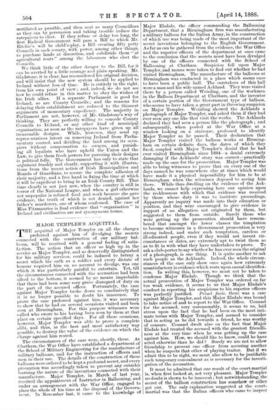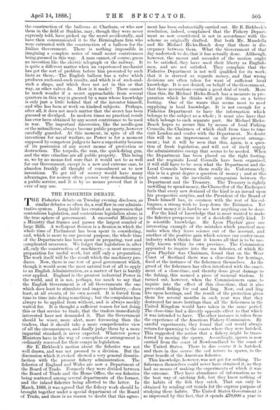MAJOR TEMPLER'S ACQUITTAL. T HE acquittal of Major Templer on all
the charges preferred against him of divulging the secrets connected with the construction of our military bal- loons, will be received with a general feeling of satis- faction. The notion that an officer so high up in the service as Major Templer, and so deservedly distinguished for his military services, could be induced to betray a secret which his oath as a soldier and every dictate of honour required him on no account to divulge, was one which it was particularly painful to entertain. Yet, till the circumstances connected with the accusation had been sifted to the bottom, it seemed by no means improbable that there had been some very grave disregard of duty on the part of the accused officer. Fortunately, the case against Major Templer broke down so conclusively that it is no longer possible to doubt his innocence. To prove the case preferred against him, it was necessary to show that he had on several occasions visited and been seen at Birmingham. For this purpose witnesses were called who swore to his having been seen by them at that place on certain specified days. For all these occasions, however, Major Templer was able to prove a complete alibi, and thus, in the best and most satisfactory way possible, to destroy the value of the evidence on which the charge against him rested. The circumstances of the case were, shortly, these. At Chatham, the War Office have established a department of the School of Military Engineering for the manufacture of military balloons, and for the instruction of officers and men in their use. The details of the construction of these balloons were ordered to be kept a profound secret, and every precaution was accordingly taken to prevent any outsider learning the nature of the inventions connected with their manufacture. Major Templer, in March of last year, received the appointment of Instructor in Ballooning, and under an arrangement with the War Office, engaged to place the whole of his time at the disposal of the Govern- ment. In November last., it came to the knowledge of Major Elsdale, the officer commanding the Ballooning Department, that a Birmingham firm was manufacturing a military balloon for the Italian Army, in the construction of which use was being made of the most important of the secret inventions belonging to the English Government. As far as can be gathered from the evidence, the War Office and the superior officers of the department at once came to the conclusion that the secrets must have been divulged by one of the officers connected with the School of Ballooning at Chatham. Suspicion fell upon Major Templer, and means were taken to find out whether he had visited Birmingham, The manufacture of the balloons at Birmingham was conducted in a place which seems once to have been a public hall. The caretakers of this hall were a man and his wife named Ackland. They were visited there by a person called Weinling, one of the workmen in the Balloon Department at Chatham, and the inventor of a certain portion of the Government type of balloon, who seems to have taken a great part in throwing suspicion on Major Templer. Weinling showed the Acklands a photograph of Major Templer, and asked them if they had ever seen any one like that visit the works. The Acklands declared they had seen a person like the photograph ; and subsequently, when posted at the War Office at a window looking on a staircase, professed to identify Major Templer as he passed. Their declaration that Major Templer visited the balloon works at Birming- ham on certain definite days, the dates of which they fixed, coupled with Major Templer's denial that he had ever visited Birmingham since 1884 a denial extremely damaging if the Acklands' story was correct—practically made up the case for the prosecution. Major Templer was able to bring witnesses to prove that on every one of the days named he was somewhere else at times which would have made it a physical impossibility for him to be at Birmingham when the witnesses deposed to seeing him there. While thus dwelling on the evidence of the Ack- lands, we cannot help expressing here our opinion upon the recklessness with which that evidence was received by those whose duty it was to institute proceedings. Apparently no inquiry was made into their education or position, and they were encouraged to give evidence in support of an allegation not originated by them, but suggested to them from outside. Surely those who were getting up the prosecution should have remem- bered that amongst the lower classes the temptation to become witnesses in a Government prosecution is very strong indeed, and under such temptation, careless or ill-educated people, even if they would not invent cir- cumstances or dates, are extremely apt to twist them so as to fit in with what they have undertaken to prove. To ask a club-porter to say whether he has ever seen the original of a photograph, is one thing. It is quite another to ask such people as the Acklands. Indeed, the whole circum- stances of the case only show once again how extremely unsatisfactory is evidence which rests upon casual identifica- tion. In writing this, however, we must not be taken to condemn Major Elsdale. Though we think that the actual prosecution of Major Templer was ordered on far too weak evidence, it seems to us that Major Elsdale's conduct in reporting his suspicions to his superior officers was perfectly justified. Prima facie, there was a case against Major Templer, and this Major Elsdale was bound to take notice of and to report to the War Office. Counsel for the accused, very unreasonably, it seems to us, laid stress upon the fact that he had been on the most inti- mate terms with Major Templer, and seemed to consider that in acting as he did towards a friend, he was worthy of censure. Counsel dwelt also on the fact that Major Elsdale had treated the accused with the greatest friendli- ness at the very time when he was getting up the case against him. How, we should like to know, could. he have acted otherwise than he did ? Surely we are not to allow friendship to prevent one officer from accusing another when he suspects that other of playing traitor. But if we admit this to be right, we must also allow to be justifiable such temporary concealment as is necessary for the investi- gation of the accusation.
It must be admitted that one result of the court-martial is, when first looked at, not very pleasant. Major Templer no doubt is shown to be innocent ; but notwithstanding, the secret of the balloon construction has somehow or other got out. The only explanation suggested at the court- martial was that the Italian officers who came to inspect the construction of the balloons at Chatham, or who saw them in the field at Suakim, may, though they were never expressly told, have picked up the secret accidentally, and have then communicated it to the Birmingham firm who were entrusted with the construction of a balloon for the Italian Government. There is nothing impossible in imagining a complete series of small secret contrivances being guessed in this way. A man cannot, of course, guess an invention like the electric telegraph or the railway. It is quite a different matter when an experienced mechanist has got the sort of problem before him presented by such facts as these,—The English balloon has a valve which produces such-and-such results, and which is of such-and- such a shape, and which does not act in this or that way, as other valves do. How is it made ? There cannot be much wonder if a secret approachable from several quarters in this way is guessed by a man whose biowledge is only just a little behind that of the inventor himself, and who has been at work on kindred subjects. Perhaps, after all, it does not much matter that the secret has been guessed or divulged. In modern times no practical result has ever been obtained by any secret contrivance to be used in war. The important discoveries, like the needle-gun or the raitrailleuse, always become public property, however carefully guarded. At this moment, in spite of all the inventions for naval warfare, no Power is for a moment supposed by competent judges to have a superiority because of its possession of any secret means of protection or destruction. The torpedo, the ram, the quick-firing gun, and the wire crinoline are all public property. This being so, we by no means feel sure that it would not be as well for our Government, except in a new and extreme case, to abandon frankly all thought of concealment as to new inventions. To get rid of secrecy would have many advantages, for secrecy often proves very demoralising to a public service, and it is by no means proved that it is ever of any use.



































 Previous page
Previous page